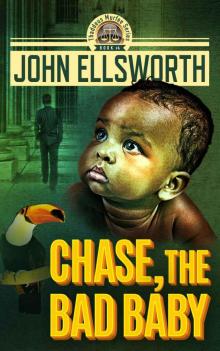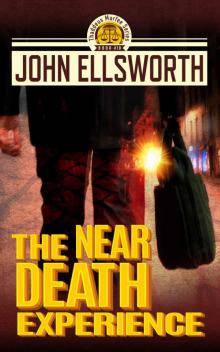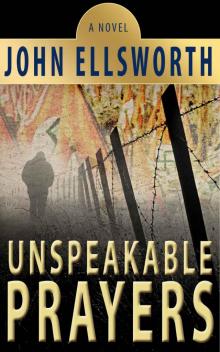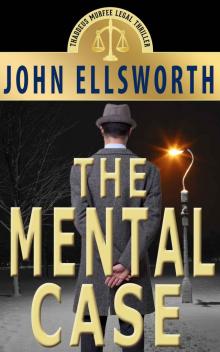- Home
- John Ellsworth
The Fifth Justice (Michael Gresham Legal Thrillers Book 10) Page 2
The Fifth Justice (Michael Gresham Legal Thrillers Book 10) Read online
Page 2
“No?”
“I’ll be going to get Reno.”
Chapter 2: Michael Gresham
I left the office before noon, ready to begin our search for Chloe Constance. Forty minutes later, when I was home, it happened.
Verona always helps me pack for these business trips, short or long as they may be. She was laying out shirts for me, blue button-downs, when she complained of not feeling well. But she laughed about it, which is our way of telling each other that whatever new problem has swooped into our lives we wouldn’t give it all that much power over us, beginning with a good laugh.
Hearing her laugh in this context, I continued selecting shirts, and she continued suitcase-folding them. Then came the slacks and a second pair of shoes and, as I had my back turned to her, pulling socks from my third drawer, it wasn’t until I turned around that I saw she was missing. I came around the bed, ready to traipse downstairs and ask whether she was all right, when I almost stepped on her.
Lying on the floor, a small gush of stomach contents inching down the side of her face, she was barely conscious.
“My chest,” she whispered, both hands gathered there. It was like she was trying to stick her hand inside and assist her heart. But then her eyes closed and her hands fell to her side.
I was already dialing 911. Then I knelt down beside her and began CPR. First, I lifted her head from behind and pressed down on her forehead, tilting her chin up. Then I checked her airway. The breath-to-compression ratio they taught me was 15:2, so I leaned into my work and began rescue breaths in-between compressions. Which was fine, except nothing changed. Her eyes remained shut and, when I stopped compressions to breathe mouth-to-mouth, she wasn’t breathing on her own. In a moment of desperate fear, I realized I was her only chance. I forced myself to continue what I was doing, keeping my own feelings out of the pictures, like wolves outside the ring of the campfire. The feelings wanted to sweep me away, and I was struggling.
As I leaned down for a rescue breath, I felt my heart beating wildly. Sweat broke out on my forehead. It wasn’t from exertion; I was frightened beyond anything I’d felt in my life. Here, beneath my hands, was the heart of the woman I treasured. I envisioned the muscle flailing, trying to produce a healthy rhythm, but failing and keeping on only because I was compressing/releasing, compressing/releasing, compressing/releasing. “Honey,” I said. “Open your eyes. Stay with me!”
But her eyes remained closed. Then I heard the emergency sirens coming down our street here in Evanston, a block over from Lake Michigan. We weren’t hard to find. The front door, downstairs, opened—I still don’t know how they got inside—and I responded to their calls by yelling back. Then I could hear them clomping double-time up the stairs and running toward our bedroom.
“We’ve got this, sir,” said the first EMT through the door. He was carrying two large tool cases. Another followed with an oxygen bottle. They attached electrodes and got the EKG recording and broadcasting its findings to the hospital. Another inserted glyceryl trinitrate under her tongue. She was unresponsive so aspirin wasn’t used. They got her oxygen level and a face mask slipped on. “Oxygen onboard,” said one responder, a heavyset man with massive hands that were, as I watched, capable of the most delicate movements. My heart rate decreased as I stood back and got out of their way.
“Heart attack,” said the technician following the EKG. He looked up at me and searched my eyes. Did I understand? It was a split-second look, but it told me everything I needed to know: this was terrible.
“Has she been having heart problems, sir?” asked the female EMT.
“Not that I’m aware of. She had her annual physical last week.”
“Means nothing,” said the same tech. “Unless it’s insurance-company business, the docs rarely run a strip.”
“I didn’t know,” I said. “But she came home and said she was in perfect health.”
It was true. She had returned from her physical exam, having stopped off at Macy’s and purchased a new silk blouse to celebrate her good health. It was a tradition with us, not unlike the kid getting the lollipop from the doctor for cooperating.
Then they had her on a gurney and were moving her out of our bedroom, down the hall, and lifting her down the stairs. It was winter, so they arranged a blanket before rolling her outside.
“You can ride with us,” said the burly EMT. “But hurry.”
“I’ve got little kids coming home from school in the next hour.”
“Call someone. You’ll want to be with her, sir.”
Enough said.
They hoisted the gurney and rolled her into the emergency truck. They helped me up into the back end with her. When I sat down beside her and took her hand in mine, her eyes fluttered open. “I’m sorry,” she whispered.
“Don’t say that, please! Nothing to be sorry about. We’re taking care of you and you will be fine. These guys have it under control.”
She responded to my reassurances by closing her eyes and drifting. I squeezed her hand and said her name, adding, “Don’t you leave me, Verona. You hear? Come back from there!”
The EMT across from me nodded her approval. “Keep talking to her. Keep telling her to return.”
“Oh, Verona, come back,” I pleaded over the wail of the emergency siren. “Don’t leave me here! Don’t leave me here! Come back!”
The ride to the hospital seemed to take forever. But it wasn’t all that long, and the next thing I knew we were rocking to a stop in the portico at Northshore University Hospital. By now, Verona was unresponsive, her arms kept flopping off the gurney, and the EMTS were dead serious. Then we were racing through the ER into the catheterization lab.
From her bedside I watched as they slipped the IV into her wrist. They drew blood. They attached hospital EKG leads with great care and the monitor sprang to life, recording her every heart muscle event. They took vitals; the ER physician team was reacting as more aid arrived. Then they asked me to leave the room because catheterization would begin.
I waited outside the cath lab, refusing to return to the public waiting area no matter how many times they directed me to do so. There was no way I was leaving my wife alone in that room. If she regained consciousness, I would be right there with her.
A young doctor—a resident—came out and told me the catheterization was underway. Then he explained what would be happening. First she was being admitted to the hospital.
“For the first 48 hours after a heart attack, she’ll be in our intensive care unit. Cardiac staff will check her heart. They will perform a series of electrocardiograms and blood tests. Doctors will continue to keep a close watch over her and give meds as needed.”
“Okay. I’ll be right there with her.”
“If she’s stable after twenty-four hours in the ICU, staff will move her to the telemetry floor, where a cardiac care team will continue to care for your wife. This is an overview only, Mr. Gresham. Everything could turn on a dime if something unanticipated comes up. But in the meantime it would be better for her—and for our staff—if you’d come with me to a private waiting room. There’s lousy coffee there and CNN but the loveseat is just about long enough to get in a nap.”
“Who’s napping? Are you kidding me?”
A nurse appeared and approached us.
“The cath is going well. Your wife has blockage but the doctors are taking care of that. She’ll be much, much better when they’re finished.”
I couldn’t stop myself from asking, “Is she going to make it?”
The hardest question I’ve ever asked. My heart was racing while I watched them share a quick look. The resident answered, “We’re doing everything we can for your wife, Mr. Gresham. Only time will tell at this point. Please go with the nurse to the waiting room, now, and give us room to do our jobs. Please.”
Reluctantly I followed the nurse to the far end of the hall, turned right, and entered a small room about the size of my kitchen. Everything was upholstered in gray or painted gray. Everything I looke
d at just leapt into focus and seemed illuminated from within—my adrenaline pumping.
For the next hour they left me alone. I called Marcel and told him to get our nanny over. He promised he would drive straight to our house and watch over the kids until the nanny arrived. He said he wanted to come to the hospital after. We agreed he should do that. I needed the support, and we both knew it. Marcel’s the strong one; I am not. We said our goodbyes. Then the cardiologist came in and introduced himself.
“It’s a significant heart attack, Mr. Gresham. There’s damage to the heart muscle itself but we don’t know the extent of that yet.”
“How is she doing?”
“Following the cath, she’s opened her eyes and asking for water. That’s always a great sign.”
“Can I see her?”
“Yes, but quickly, before she goes up to the ICU. She’ll remain there for a day or two and they’ll limit your access to her. So tell her you love her now and that you’ll be waiting for her. She needs to hear that from you.”
“Will do.”
Without waiting to be asked or told, I was up and out of that room and flying down the hall to the cath lab. Inside I went. No one paid any attention. Then I said her name. She managed the slightest smile when she saw me. “My love,” she whispered. “Missed you.”
Tears flooded my eyes as I stood there holding her hand, lacing fingers with her.
“I love you, too,” I said without breaking down only through force of my will. I didn’t want to come unglued in front of her and didn’t.
She forced another slight smile. “Take me home.”
“Believe me if I only—”
“Mr. Gresham, we’ll move your wife now. Someone will come for you.”
I leaned down and kissed her forehead. “I’ll take you home as soon as I can.”
Back I went to the family waiting room. Marcel was there, waiting for me. We did a man-hug, and he shook his head. “I’m sorry, boss. Now bring me up to speed.”
I did just that. After, we talked about several cases, including the case of the missing lawyer, Chloe Constance. We decided Marcel would begin the search first thing in the morning and we laid out those plans.
He went down to the cafeteria—yes, 24/7—and returned with egg salad sandwiches and real coffee. We munched away, sharing a bag of potato chips, and commenting on the CNN stories floating through the ether above our heads just outside the TV I hadn’t been able to turn off. Much of that night was surreal.
“I think I should stay close by for the next twenty-four,” Marcel said. “Chloe Constance can wait one more day.”
I had to agree. The woman had been missing for too long already but I didn’t see how another day would change that. Marcel, we decided, would return to my house and supervise child care and getting little guys off to school, lunches and lunch money, transportation, and all the rest. Then we man-hugged again, and he left.
An hour later, they directed me upstairs to a waiting area just outside the glass walls of the ICU pod where they’d moved Verona. They allowed me to pop in again and let her know I was just outside. This time I got to lay my cheek against hers and whisper how much I loved her. The nurse stood aside until I had overstayed my welcome then shooed me back to the waiting area. This time there was no TV, no CNN, just silence except for the occasional flurry of voices and activity as they addressed sudden needs around the ward. Otherwise, it was a very busy but silent place.
It was two a.m. now.
At long last I removed my shoes and lifted my legs onto the short—gray—couch.
Within seconds I was asleep. But I was ready to leap up and visit my love again as soon as they allowed it.
I wasn’t going anyplace.
Chapter 3: Michael Gresham
Forty-eight hours later, they moved Verona into a private room. Telemetry was engaged while I watched. Once the techs were happy, I approached my wife. The nurse was between us, so I circled around the bed and leaned down. Verona presented her lips for a kiss—which I knew was a good sign. We exchanged a few words and then I took the chair next to her. We were holding hands when her cardiologist strode into the room. He nodded at me, greeted Verona almost exuberantly, and applied his stethoscope to her chest. He then checked the monitors before turning to us.
“You should know the heart is damaged.”
“How bad is it?” I said before I could silence my tongue. I thought this conversation might be better out in the hallway, but the doctor wanted Verona to hear.
“It’s not good but Verona will leave here better than she was for quite some time. Some of the heart muscle damage is old. She was having small attacks that were going unnoticed.”
“What can you do about the damage?”
“We can compensate for it. We can use medicines and rehab. We won’t get it back one-hundred percent, but she’ll be feeling a whole lot better. Remember how tired you’ve been, sweetheart?”
“Yes.”
“Now you know why.”
“I didn’t know,” I said to her. “Why didn’t you tell me you were so tired?”
The doctor answered for her. “Heart patients have a way of not complaining until sometimes it’s too late. We try to educate them so they don’t ignore things like shortness of breath and chest pain and anxiety and dread. We’ll spend time with those warning signs. It’s part of what we do here.”
“Will she be able to resume normal activities?” I asked.
“Most likely.”
“Will we need to monitor her from now on?”
“What do you mean?”
Verona said, “He means can he return to work or will he need to be hovering over me.”
“Life will resume much like before. We have our protocols for rehab and we’ll soon have you up and feeling great. No need to stay away from the office, Mr. Gresham.”
“Michael.”
“Michael.”
Then he was gone and I spent the next twenty-four hours with Verona. The couch beneath the single window let down into a cot—I wouldn’t call it a bed, it wasn’t. But I could grab naps here and there, most often while Verona dozed between interruptions by the nurses, respiratory techs, housekeeping, and all the rest.
On the fourth day, I took her home. It was amazing, because the docs wanted her up and around and she was feeling like throwing on some sweats and shuffling around the house. It cut my fear level to see her moving about, but I was still on pins and needles with worry.
On the fifth day, she kicked me out of the house. “Time for you to get back to work,” she said. “I’m doing fine and you’re driving me nuts with your hovering.”
“I’m not hovering,” I said. “I’m keeping a close eye. I’m following closely.”
“BS, you’re hovering. Now go—go to the office and let me be. I need quiet.”
I couldn’t argue with that, so off I went, back to work.
Andrew called me at home that night to say he’d told the White House Chloe was missing. They’d agreed the nomination would be put on the back burner—for a limited time, after which the President would move on and nominate someone else to the judgeship.
Marcel and I met with Andrew at the office of Chloe’s psychiatrist the next morning. We were developing our search strategy and she seemed a fitting place to begin.
We were looking for the names of alternate personalities, clues where they might take her, anything that could give us a thread we might follow.
The psych was Betty Ingram. Dr. Ingram was mid-fifties and Vogue-ish, a stylized dresser and a fan of expensive cosmetics and scents. I liked her right off the bat, with her quick smile and engaging eyes. She led us into her inner office where we assembled on the couch and an easy chair.
She started us off.
“I understand Chloe is still missing. Andrew says no new developments. For the sake of our newcomers, please know Andrew and I speak every day, often more than once.”
“She’s counseling me now that Chloe’s gone,”
Andrew tried to say matter-of-factly, but he choked when he acknowledged his situation.
“And that’s okay, Andrew, if ‘counseling’ is what you want to call it. Behavioral difficulties present a problem for the entire family, not just for the suffering patient. Many disorders must be treated holistically. The entire family needs to get involved if there is to be lasting relief.”
“I can appreciate that,” I said.
“When Andrew called, he said you wanted to meet with me so you could try to understand Chloe’s situation better. Let’s look inside our missing lady. First, Chloe carries around inside her at least three other people. In my years of working with her, I’ve pretty well mapped out these alter personalities.”
“Do you have names for us?” Marcel wanted to know.
“I have two. One is called Maddy. She’s a destructive teenager. Another is called Justin. Justin is Chloe’s protector. He is tough and smart and saves her from the ridiculous situations Maddy puts her in. Stolen car? Justin is there to help her flee the scene. Wake up in a stranger’s bed—thanks to Maddy’s rampant promiscuity—Justin gets her home safe and sound. I’m sure if I look back through my notes I’ll find others for you. Leave your card, Michael, and I’ll call you with more details as I review.”
“Done,” I said, and whipped a card out of my jacket. I passed it to her, and she arranged it on her desk.
“What about escape plans,” Marcel asked. “Had she shared with you any plans to run from Andrew? Or run from anything or anyone?”
The doctor smiled a peculiar smile. “That is hard to answer. Maddy, the teenager, is volatile. My sense is that she would take her far away given a chance. But designs on fleeing—we hadn’t ever talked about that.”
“Why wasn’t Maddy running the whole show?” I asked. “She sounds smart and cunning.”
“Chloe was also a strong personality. Stronger than Maddy. She could fight her down, send her off to her room, so to speak. Sometimes. Other times, Maddy won.”

 Girl, Under Oath (Michael Gresham Series)
Girl, Under Oath (Michael Gresham Series) The Fifth Justice (Michael Gresham Legal Thrillers Book 10)
The Fifth Justice (Michael Gresham Legal Thrillers Book 10) Michael Gresham (Book 5): Sakharov the Bear
Michael Gresham (Book 5): Sakharov the Bear Voices In The Walls: A Psychological Thriller (Michael Gresham Series)
Voices In The Walls: A Psychological Thriller (Michael Gresham Series) Chase, the Bad Baby: A Legal and Medical Thriller (Thaddeus Murfee Legal Thriller Series Book 4)
Chase, the Bad Baby: A Legal and Medical Thriller (Thaddeus Murfee Legal Thriller Series Book 4) The Girl Who Wrote The New York Times Bestseller: A Novel (Thaddeus Murfee Legal Thrillers Book 8)
The Girl Who Wrote The New York Times Bestseller: A Novel (Thaddeus Murfee Legal Thrillers Book 8) The Defendants: Crime Fiction & Legal Thriller (Thaddeus Murfee Legal Thriller Series Book 1)
The Defendants: Crime Fiction & Legal Thriller (Thaddeus Murfee Legal Thriller Series Book 1) Hellfire (Sisters In Law Book 2)
Hellfire (Sisters In Law Book 2) A Young Lawyer's story
A Young Lawyer's story Annie's Verdict (Michael Gresham Legal Thrillers Book 6)
Annie's Verdict (Michael Gresham Legal Thrillers Book 6) Legal Thriller: Michael Gresham: Secrets Girls Keep: A Courtroom Drama (Michael Gresham Legal Thriller Series Book 2)
Legal Thriller: Michael Gresham: Secrets Girls Keep: A Courtroom Drama (Michael Gresham Legal Thriller Series Book 2) 30 Days of Justis
30 Days of Justis Sakharov the Bear (Michael Gresham Legal Thrillers Book 5)
Sakharov the Bear (Michael Gresham Legal Thrillers Book 5) Defending Turquoise (Thaddeus Murfee Legal Thriller Series Book 5)
Defending Turquoise (Thaddeus Murfee Legal Thriller Series Book 5) The Near Death Experience (Thaddeus Murfee Legal Thriller Series Book 10)
The Near Death Experience (Thaddeus Murfee Legal Thriller Series Book 10) Unspeakable Prayers: WW II to Present Day (Thaddeus Murfee Series of Legal Thrillers)
Unspeakable Prayers: WW II to Present Day (Thaddeus Murfee Series of Legal Thrillers) Attorney at Large (Thaddeus Murfee Legal Thriller Series Book 3)
Attorney at Large (Thaddeus Murfee Legal Thriller Series Book 3) The Law Partners (Michael Gresham Legal Thriller Series Book 3)
The Law Partners (Michael Gresham Legal Thriller Series Book 3) Annie's Verdict
Annie's Verdict The Mental Case (Thaddeus Murfee Legal Thriller Series Book 6)
The Mental Case (Thaddeus Murfee Legal Thriller Series Book 6)